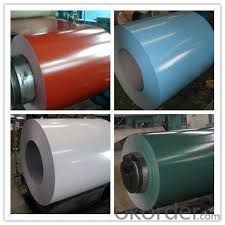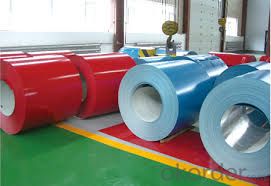Pre-Painted Steel Coil/Pre-Painted Galvanized Stell Coil
- Loading Port:
- Shanghai
- Payment Terms:
- TT OR LC
- Min Order Qty:
- 25 m.t.
- Supply Capability:
- 10000 m.t./month
OKorder Service Pledge
OKorder Financial Service
You Might Also Like
Product Description
Specification:
1) Standard: JIS G3302-1998/EN10142/ASTM A653/ASTM A792/ AISI/BS/ DIN/GB
2) Grade:DX51D+Z
3) Thickness: 0.12mm-0.6mm, all available
4) Width: 600mm-1250mm, all available
5) Length: according to the customer's request
6) Coil ID: 508/610mm
7) Hardness:Soft,full hard
8) Zinc Coating: 50-150g
9) Paint coating: Top 15-20mirco ,back 7mirco
10) Color series: Sea blue,white grey and all RAL color
PPGI,(PPGL,pre-painted galvanized steel coils, pre-painted galvalume steel coils,color coated steel coils.color coated galvanized steel coils)
1, Introduction: PPGI is made of galvanized steel coils or galvalume steel coils with polymer coatings as surface. It's a new enclosure material and building board
2, Product feature: Apperance of a variety of color Antirust and antiseptic,durability,etc.
3, Production Process: Pretreatment(Degreasing) DryingChromatingPaint Basic OilCoolingDryingColor CoatingCoolingFilm- coveringRolling Up
4, Application: it is ideal for a wide range of applications,, such as pre-engineered buildings, architectural panels, roofing, siding, cladding, and many other building components.and also used back plate of appliance; wide range of construction, furniture industry, transportation industry, etc.
- Q:How do steel coils contribute to the construction equipment industry?
- Steel coils play a crucial role in the construction equipment industry by providing the necessary raw material for manufacturing various construction machinery and equipment. These coils, made from high-quality steel, are used in the fabrication of a wide range of construction equipment, such as cranes, bulldozers, excavators, loaders, and forklifts. The primary contribution of steel coils to the construction equipment industry lies in their structural strength and durability. Steel is known for its excellent mechanical properties, including high tensile strength, toughness, and resistance to wear and corrosion. These qualities make it an ideal material for constructing heavy-duty machinery that can withstand the demanding conditions of construction sites. Steel coils are used to manufacture the structural components of construction equipment, such as chassis, frames, booms, buckets, and attachments. These components need to be robust and able to withstand heavy loads, impacts, and constant use. Steel coils provide the necessary strength and reliability to ensure the longevity and performance of construction equipment. Furthermore, steel coils are also used to fabricate specialized parts and accessories for construction machinery. These include hydraulic systems, gears, shafts, bearings, and fasteners. These components are crucial for the proper functioning and efficiency of construction equipment, and steel coils provide the high-quality material needed to manufacture them. In addition to their mechanical properties, steel coils also contribute to the construction equipment industry through their versatility and customization options. Steel can be easily shaped, cut, welded, and formed into various shapes and sizes, allowing manufacturers to create equipment with specific designs and functionalities to meet the diverse needs of construction projects. Overall, steel coils are indispensable in the construction equipment industry as they provide the foundation for robust and reliable machinery. Their strength, durability, and versatility make them an essential raw material for manufacturing construction equipment that can withstand the rigors of the construction site and ensure the safety and efficiency of construction projects.
- Q:What are the dimensions of steel coils used in the oil and gas industry?
- The dimensions of steel coils used in the oil and gas industry can vary depending on the specific application and requirements. However, there are some common dimensions that are frequently used. Steel coils used in the oil and gas industry typically have a width ranging from 600mm to 2000mm. The outer diameter of the coil can range from 800mm to 2200mm, while the inner diameter can range from 508mm to 610mm. The weight of the coil can vary as well, ranging from a few tons to several tens of tons. These dimensions are designed to meet the needs of various processes involved in the oil and gas industry, such as pipe manufacturing, storage tank fabrication, and offshore platform construction. It is important to note that these dimensions are not fixed and can be customized based on the specific requirements of each project.
- Q:What are the different steel coil packaging methods?
- Some of the different steel coil packaging methods include wrapping the coil with plastic or paper, using steel strapping or banding to secure the coil, placing it in a wooden crate or box, or using steel or plastic sleeves to protect the edges of the coil.
- Q:How are steel coils used in the production of industrial equipment?
- Steel coils are a vital component in the production of industrial equipment. These coils are large, flat rolled sheets of steel that are typically used as raw material in various manufacturing processes. Firstly, steel coils are used for fabrication purposes, where they are cut, shaped, and welded together to create the framework or structure of industrial equipment. This includes machinery, heavy-duty vehicles, storage tanks, and other industrial components. The coils provide the necessary strength and durability to withstand the demanding conditions faced by industrial equipment. Additionally, steel coils are often formed into specific shapes to produce parts and components for industrial machinery. These parts can include gears, shafts, bearings, brackets, and many others. The versatility of steel allows it to be easily manipulated and fabricated into different shapes and sizes, making it an ideal material for such applications. Moreover, steel coils are also used in the construction of industrial equipment, particularly in the manufacturing of boilers, heat exchangers, and pressure vessels. These coils are typically formed into tubes or pipes, which are then welded or brazed together to create the necessary structure for these equipment. The high strength and heat resistance properties of steel make it the preferred material for such applications, ensuring the safe and efficient operation of industrial processes. In summary, steel coils play a crucial role in the production of industrial equipment. They are used as raw material for fabrication, forming parts and components, and constructing crucial equipment such as boilers and pressure vessels. The durability, strength, and versatility of steel make it an indispensable material in the manufacturing industry.
- Q:How is the demand for steel coils influenced by the construction sector?
- The construction sector heavily influences the demand for steel coils. These coils are essential in construction as they are used for various purposes such as structural framework, roofing, fencing, and reinforcement. There are several factors that drive the construction sector's demand for steel coils. Firstly, as the construction industry grows and expands, the need for steel coils increases to meet the rising demand for new infrastructure, commercial buildings, and residential properties. This includes the construction of bridges, highways, airports, office complexes, residential towers, and more. Secondly, the demand for steel coils in the construction sector is influenced by economic conditions. When the economy is performing well and there is increased investment in construction projects, the demand for steel coils tends to rise. Conversely, during economic downturns or recessions, the construction sector slows down, resulting in a decrease in demand for steel coils. Furthermore, changes in construction techniques and advancements in technology also impact the demand for steel coils. As new construction methods and materials are introduced, the use of steel coils may increase or decrease depending on their compatibility and effectiveness in these new applications. For example, the popularity of pre-engineered steel buildings has led to an increased demand for steel coils. Government policies and regulations also play a crucial role in shaping the demand for steel coils in the construction sector. Government initiatives promoting infrastructure development, sustainable construction practices, or energy-efficient buildings can significantly impact the demand for steel coils. For instance, incentives for green buildings may drive the use of steel coils in construction projects aiming for LEED certification. In conclusion, the demand for steel coils is tightly connected to the construction sector. Economic conditions, construction activity, technological advancements, and government policies all influence the demand for steel coils in the construction industry. Understanding these factors is crucial for steel manufacturers and suppliers to effectively meet the needs of the construction sector.
- Q:How are steel coils weighed?
- Steel coils are usually weighed using industrial scales or weighing machines. These scales are specifically designed to handle the heavy weight of steel coils and provide accurate measurements. The coils are placed on the scale, and the weight is determined based on the pressure exerted on the scale's sensors.
- Q:Can steel coils be used in the automotive industry?
- Yes, steel coils can be used in the automotive industry. Steel coils are commonly used in the manufacturing of various automotive components and parts. They are particularly suitable for applications that require high strength and durability, such as body panels, chassis components, suspension parts, and engine components. Steel coils provide excellent structural integrity, corrosion resistance, and impact resistance, which are crucial characteristics for automotive applications. Additionally, steel coils can be easily formed and shaped into the desired dimensions, making them highly versatile and cost-effective for automotive manufacturers. Overall, steel coils are widely utilized in the automotive industry due to their exceptional mechanical properties and suitability for various automotive applications.
- Q:What are the advantages of using steel coils?
- There are several advantages of using steel coils. Firstly, steel coils offer superior strength and durability, making them suitable for various applications in industries such as construction, automotive, and manufacturing. Secondly, steel coils have excellent resistance to corrosion, ensuring longevity and reducing maintenance costs. Additionally, steel coils can be easily shaped or formed into different sizes and shapes, providing flexibility in design and manufacturing processes. Lastly, steel coils are recyclable, making them an environmentally friendly choice and contributing to sustainable practices.
- Q:I read that contrary to popular belief, today's folded steel swords are only made that way for tradition and cosmetics. In the past steel was very impure and therefore had to be folded in order to make a good sword. Today's steel manufacturing provides very pure steel and so folding the metal only makes it look nicer, but does nothing to improve the function of the blade.What do you think of this?
- This Site Might Help You. RE: Does folding modern steel do anything to enhance a sword? I read that contrary to popular belief, today's folded steel swords are only made that way for tradition and cosmetics. In the past steel was very impure and therefore had to be folded in order to make a good sword. Today's steel manufacturing provides very pure steel and so folding the...
- Q:What are the different types of steel coil edge trimming methods?
- There are several different types of steel coil edge trimming methods, including shearing, slitting, and laser cutting. Shearing involves cutting the edges of the coil with a sharp blade, while slitting involves making multiple cuts to create narrower strips. Laser cutting uses a high-powered laser to precisely trim the edges of the coil. Each method has its own advantages and is used depending on the specific requirements of the steel coil application.
1. Manufacturer Overview |
|
|---|---|
| Location | |
| Year Established | |
| Annual Output Value | |
| Main Markets | |
| Company Certifications | |
2. Manufacturer Certificates |
|
|---|---|
| a) Certification Name | |
| Range | |
| Reference | |
| Validity Period | |
3. Manufacturer Capability |
|
|---|---|
| a)Trade Capacity | |
| Nearest Port | |
| Export Percentage | |
| No.of Employees in Trade Department | |
| Language Spoken: | |
| b)Factory Information | |
| Factory Size: | |
| No. of Production Lines | |
| Contract Manufacturing | |
| Product Price Range | |
Send your message to us
Pre-Painted Steel Coil/Pre-Painted Galvanized Stell Coil
- Loading Port:
- Shanghai
- Payment Terms:
- TT OR LC
- Min Order Qty:
- 25 m.t.
- Supply Capability:
- 10000 m.t./month
OKorder Service Pledge
OKorder Financial Service
Similar products
New products
Hot products
Hot Searches
Related keywords





























